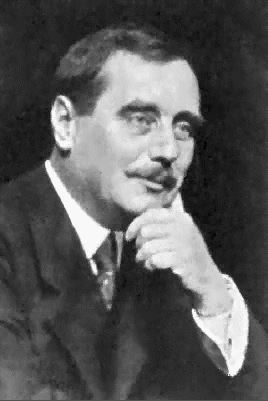 |
Craig White's Literature Courses
Wells's Law |
 H. G. Wells (1866-1946) |
"Wells's Law" is a principle described by H.G. Wells (see below) by which science fiction maintains a respectable degree of realism and avoids turning into fantasy.
According to the
Encyclopedia of Science Fiction,
In another story, a
![]()
. . . Anyone can invent human beings inside out or worlds like dumb-bells or a gravitation that repels. The thing that makes such imaginations interesting is their translation into commonplace terms and a rigid exclusion of other marvels from the story. Then it becomes human.
"How would you feel and what might not happen to you," is the typical question, if for instance pigs could fly and one came rocketing over a hedge at you. How would you feel and what might not happen to you if suddenly you were changed into an ass and couldn't tell anyone about it? Or if you became invisible?
But no one would think twice about the answer if hedges and houses
also began to fly, or if people changed into lions, tigers, cats and dogs left
and right, or if everyone would vanish anyhow. Nothing remains interesting,
where anything may happen.
For the writer of fantastic stories to help the reader to play the game properly, he must help him in every possible unobtrusive way to domesticate the impossible hypothesis. He must trick him into an unwary concession to some plausible assumption and get on with his story while the illusion holds.
And that is where there was a certain slight novelty in my stories when first they appeared. Hitherto, except in exploration fantasies, the fantastic element was brought in by magic. Frankenstein even, used some jiggery-pokery magic to animate his artificial monster. There was trouble about the thing's soul. But by the end of last century it had become difficult to squeeze even a momentary belief out of magic any longer.
It occurred to me that instead of the usual
interview with the devil or a magician, an ingenious use of scientific patter
[language, jargon]
might with advantage be substituted. That was no great discovery. I simply
brought the fetish stuff up to date, and made it as near actual theory as
possible.
As soon as the
magic trick has been done the whole business of the fantasy writer is to keep
everything else human and real. Touches of prosaic detail are imperative and a
rigorous adherence to the hypothesis. Any extra fantasy outside the cardinal
assumption immediately gives a touch of irresponsible silliness to the
invention.
cf. Washington Post review of Naomi Alderman's The Power
![]()